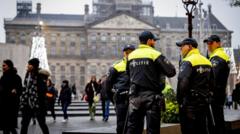Amsterdam continues to navigate fragile tensions after a series of violent incidents erupted last week when Israeli football fans faced attacks in the city. City officials characterized the unrest as a troubling mix of antisemitism, hooliganism, and anger linked to the ongoing conflict in Gaza and broader Middle Eastern tensions. These events have not only complicated community dynamics in Amsterdam but also had significant repercussions on the political landscape in the Netherlands.
Amidst heightened security efforts, the unrest began when fans of Maccabi Tel Aviv gathered for a Europa League match against Ajax. Prior to the match, reports surfaced of Maccabi supporters engaging in provocative acts, such as tearing down and burning a Palestinian flag. This incident, coupled with inflammatory chants, intensified heat in a city already under stress from protests and social discord related to the Palestinian-Israeli conflict.
Columnist Emine Uğur of the Muslim community stated that the violence appeared inevitable, fueled by longstanding grievances from affected groups. Tensions erupted further during the match night, as pro-Palestinian protests were diverted away from central venues, escalating violent reactions against Israeli fans.
A comprehensive city report noted that while some Israeli supporters engaged in vandalism, they were also targeted by groups in hit-and-run assaults across Amsterdam. Mayor Femke Halsema expressed serious concern over the situation, especially given its coinciding with the anniversary of the Kristallnacht, a historic pogrom against Jews in Germany. The resonance of such historical events heightened fears among the Jewish community in Amsterdam.
In response to the violence, the Dutch government allocated €4.5 million to tackle antisemitism and assist victims of the attacks. Justice Minister David van Weel highlighted the need for Jewish people to feel secure in their own country, but concerns remain that this funding alone may not be enough to combat the rising antisemitic rhetoric prevalent since the conflict escalated on October 7.
Political fallout has been notable, particularly following the resignation of junior minister Nora Achahbar, who cited racist remarks made during a cabinet meeting post-violence. Leaders from within the coalition government, including Geert Wilders from the far-right, have directed blame towards youth of Moroccan descent for the unrest, leading to accusations of scapegoating among the Moroccan community.
Amidst these tensions, advocates and community leaders call for caution in politicizing antisemitism, warning that it can perpetuate Islamophobic sentiments. Rabbi Lody van de Kamp stressed the importance of coexistence, urging communities to resist letting anger turn into hatred. This sentiment echoes concerns within the Jewish community, where some members have taken precautions like removing symbols of their faith for fear of backlash.
As Amsterdam seeks to heal, academic voices remind residents of the need for clear and careful communication to prevent further divisions. The city, known for its diversity and tolerance, faces critical questions about identity and community bonds in a time of increased polarization. Comprehensive dialogues and mutual understanding are viewed as essential tools for fostering reconciliation and crafting a safer future for all citizens of Amsterdam.






















